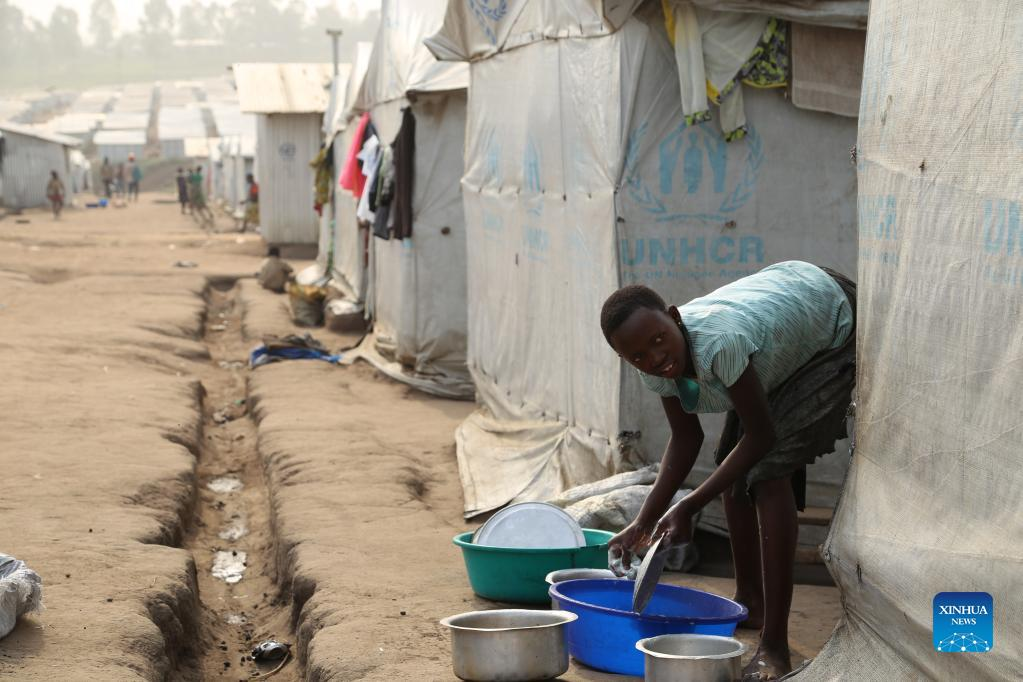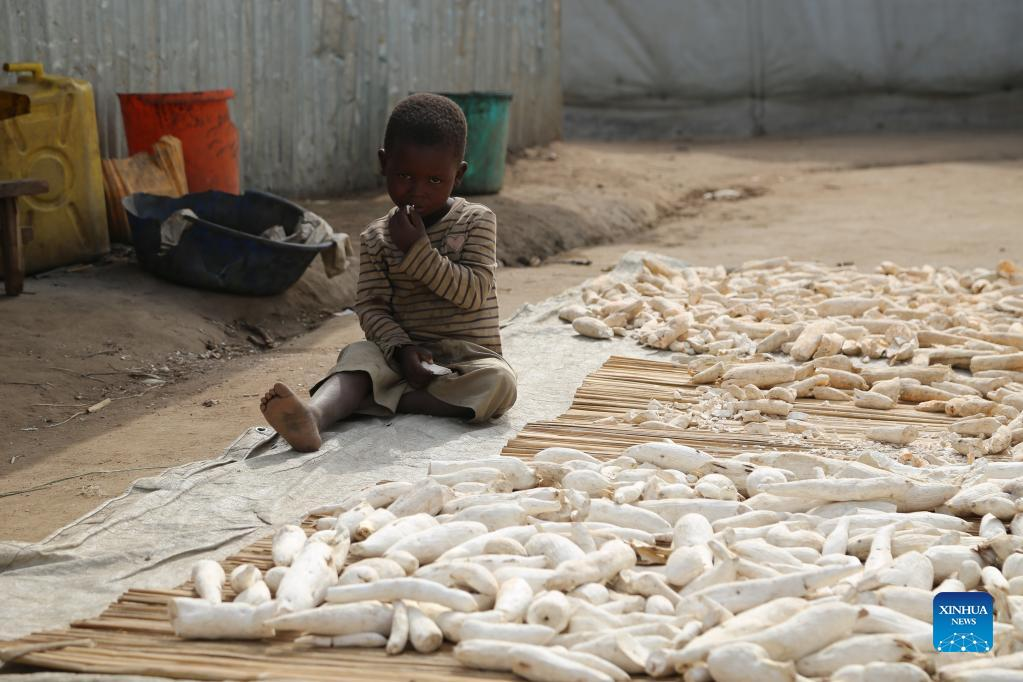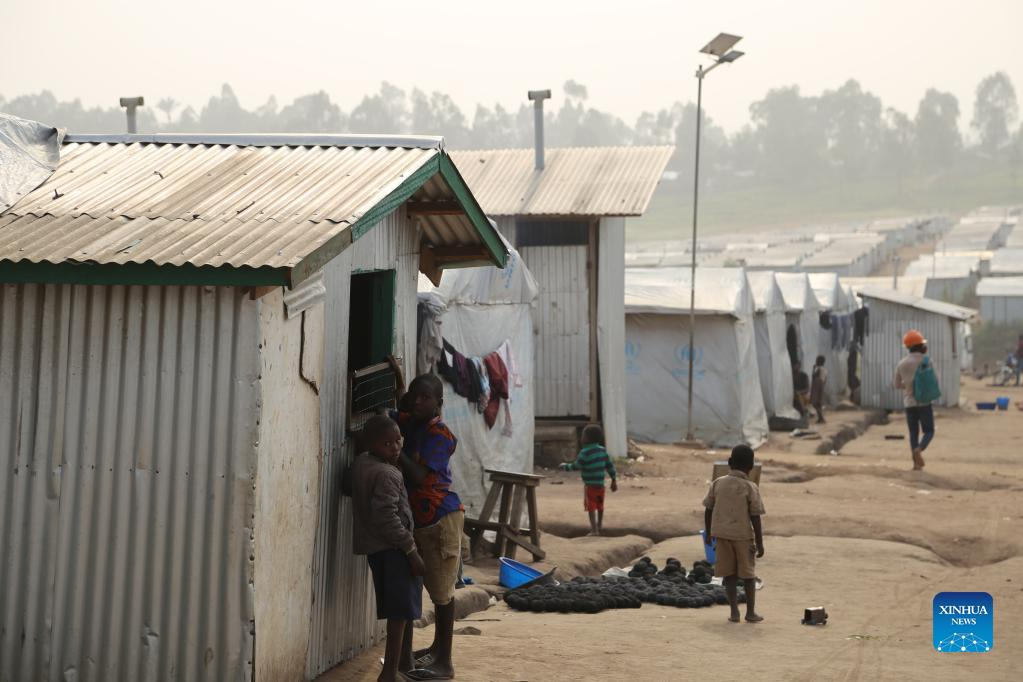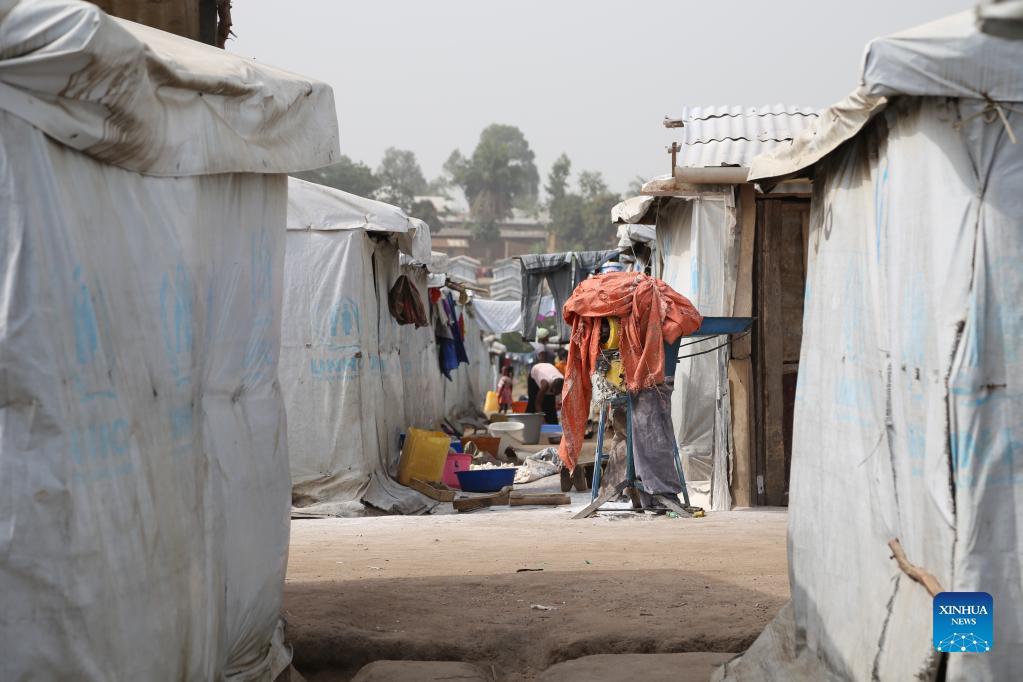
A refugee washes clothes in a camp for internally displaced persons (IDPs) in Ituri province, northeastern Democratic Republic of the Congo, March 17, 2022. Despite all the challenges, peace and state authority will be restored in Ituri, a violence-laden province in northeastern Democratic Republic of the Congo (DRC), reassured Lieutenant-General Johnny Luboya, Ituri's military governor, in a recent exclusive interview with Xinhua. (Photo by Alain Uaykani/Xinhua)
by Alain Uaykani
BUNIA, DR Congo, March 28 (Xinhua) -- Despite all the challenges, peace and state authority will be restored in Ituri, a violence-laden province in northeastern Democratic Republic of the Congo (DRC), reassured Lieutenant-General Johnny Luboya, Ituri's military governor, in a recent exclusive interview with Xinhua.
In office since May 2021, when Ituri and the neighboring province of North-Kivu, both under the shadow of decades-long armed conflicts, were placed under the state of siege and military rule, Luboya spoke about the achievements, challenges, as well as his plan and determination to restore peace and state authority in the region once and for all.
For the Lieutenant-General, nearly eleven months after his appointment as Ituri's military governor, outcomes have been met with several military operations launched by the Congolese Army (FARDC) in Ituri's Djugu territory, one of the regions hardest-hit by violence, in particular, by the militia of the cooperative group for the development of Congo (CODECO).
"The first phase of our military operations on the ground was first to recover large cities and arteries closed down by the militiamen, including the roads of national interest. We have done this work very successfully by capturing all enemy strongholds of interest," said Jonny Luboya, at his office in Bunia, Ituri's capital.
According to the UN Refugee Agency (UNHCR), there are 5.6 million displaced people scattered across the country who were forced to flee their homes from bloodshed, more than 2.5 million of whom are now seeking refuge in Ituri.
The eastern part of country, Ituri and North Kivu, in particular, are now seeing an increase in the activity of armed groups, who are taking advantage of a security vacuum in the region, according to a recent report by UNHCR. Thousands of asylum-seekers have even crossed the border into Uganda.
The military operations on the ground made it possible to chase away the militiamen and shut down the economic fabric enjoyed by the militiamen in several areas, including the controls of the mining areas in most of the territory, said the military governor.
Despite the ongoing military operations, the militiamen have still continued to lay hands on the defenseless civilians in Djugu, by increasing brutal and indiscriminate attacks targeting camps for the displaced, including militia attacks in early February on the Savo camp, killing at least 58 civilian refuge-seekers.
During a press conference last week, the UN peace-keeping mission in DRC (MONUSCO) expressed concerns over the violence on the rise in Ituri, despite the enforcement of a state of siege, which was supposed to end the atrocity in the first place.
According to the Lieutenant-General, the militia attacks against the civilian population currently in the territory mirror in fact the pressure of the military operations by the DRC authorities, which would last "until the effective restoration of peace".
The recent flare-up of militia attacks "is indeed the results of the pressure that our forces are exerting against the militiamen. This pressure will continue permanently until the effective restoration of peace," he said, calling on the population to be patient and trust the military operations in progress.
Speaking of restoring the economy of the province, Johnny Luboya pointed out that the military operations that have chased away militiamen and rebels hogging the main roads allowed the economic activities to regain momentum and vitality.
"The military efforts that we are carrying out have allowed the economy of the province to regain stability by, for example, securing the roads to allow citizens to travel without the risk of being ambushed (by militiamen)," said the head of Ituri's military authority, adding that several rehabilitation projects have been in place to keep the roads open.
"We know the challenges are huge on many fronts, but we remain optimistic about the future of this province. We are appealing to our people to trust our ability to restore peace, and we will get there," said the military governor. ■

A child is seen in a camp for internally displaced persons (IDPs) in Ituri province, northeastern Democratic Republic of the Congo, March 17, 2022. Despite all the challenges, peace and state authority will be restored in Ituri, a violence-laden province in northeastern Democratic Republic of the Congo (DRC), reassured Lieutenant-General Johnny Luboya, Ituri's military governor, in a recent exclusive interview with Xinhua. (Photo by Alain Uaykani/Xinhua)

Children are seen in a camp for internally displaced persons (IDPs) in Ituri province, northeastern Democratic Republic of the Congo, March 17, 2022. Despite all the challenges, peace and state authority will be restored in Ituri, a violence-laden province in northeastern Democratic Republic of the Congo (DRC), reassured Lieutenant-General Johnny Luboya, Ituri's military governor, in a recent exclusive interview with Xinhua. (Photo by Alain Uaykani/Xinhua)

Photo taken on March 17, 2022 shows a view of a camp for internally displaced persons (IDPs) in Ituri province, northeastern Democratic Republic of the Congo. Despite all the challenges, peace and state authority will be restored in Ituri, a violence-laden province in northeastern Democratic Republic of the Congo (DRC), reassured Lieutenant-General Johnny Luboya, Ituri's military governor, in a recent exclusive interview with Xinhua. (Photo by Alain Uaykani/Xinhua)
